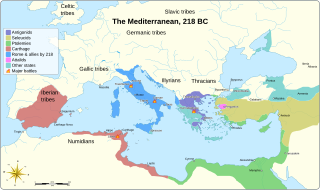This article concerns the period 219 BC – 210 BC.
Year 215 BC was a year of the pre-Julian Roman calendar. At the time it was known as the Year of the Consulship of Albinus/Marcellus/Verrucosus and Gracchus. The denomination 215 BC for this year has been used since the early medieval period, when the Anno Domini calendar era became the prevalent method in Europe for naming years.

Year 216 BC was a year of the pre-Julian Roman calendar. At the time it was known as the Year of the Consulship of Varro and Paullus. The denomination 216 BC for this year has been used since the early medieval period, when the Anno Domini calendar era became the prevalent method in Europe for naming years.

Lucius Aemilius Paullus Macedonicus was a two-time consul of the Roman Republic and a noted general who conquered Macedon, putting an end to the Antigonid dynasty in the Third Macedonian War.

Lucius Cornelius Scipio Barbatus was one of the two elected Roman consuls in 298 BC. He led the Roman army to victory against the Etruscans near Volterra. A member of the noble Roman family of Scipiones, he was the father of Lucius Cornelius Scipio and Gnaeus Cornelius Scipio Asina and great-grandfather of Scipio Africanus.

A dictator was a magistrate of the Roman Republic, entrusted with the full authority of the state to deal with a military emergency or to undertake a specific duty. All other magistrates were subordinate to his imperium, and the right of the plebeian tribunes to veto his actions or of the people to appeal from them was extremely limited. However, in order to prevent the dictatorship from threatening the state itself, severe limitations were placed upon its powers: a dictator could only act within his intended sphere of authority; and he was obliged to resign his office once his appointed task had been accomplished, or at the expiration of six months. Dictators were frequently appointed from the earliest period of the Republic down to the Second Punic War, but the magistracy then went into abeyance for over a century, until it was revived in a significantly modified form, first by Sulla, and then by Julius Caesar. The office was formally abolished after the death of Caesar, and not revived under the Empire.

Gaius Flaminius C. f. L. n. was a leading Roman politician in the third century BC. Twice consul, in 223 and 217, Flaminius is notable for his Lex Flaminia land reform of 232, the construction of the Circus Flaminius in 221, and his battle against Hannibal's army in 217 during the Second Punic War where he was defeated and killed. Flaminius is celebrated by ancient sources as being a skilled orator and a man possessed of great piety, strength, and determination. He is, however, simultaneously criticised by ancient writers such as Cicero and Livy for his popular policies and disregard of Roman traditions, particularly during the terms of his tribunate and second consulship.
Appius Claudius Pulcher was a Roman politician of the 3rd century BC, active in the Second Punic War.

Gaius Claudius Nero was a Roman general active during the Second Punic War against the invading Carthaginian force, led by Hannibal Barca. He should not be confused with the Roman Emperor Nero. During a military career that began as legate in 214 BC, he was propraetor in 211 BC during the siege of Capua, before being sent to Spain that same year. He became consul in 207 BC.
Quintus Pleminius was a propraetor in 205 BC. He was given command over Locri in Bruttium by Scipio Africanus after its recapture, considered the "outstanding event" in Sicilian operations that year. His governorship, if it should be called that, ended in sacrilege and murder.
Marcus Valerius Laevinus was a Roman consul and commander who rose to prominence during the Second Punic War and corresponding First Macedonian War. A member of the gens Valeria, an old patrician family believed to have migrated to Rome under the Sabine king T. Tatius, Laevinus played an integral role in the containment of the Macedonian threat.

The Battle of Canusium was a three-day engagement between the forces of Rome and Carthage. It took place in Apulia during the spring of 209 BC, the tenth year of the Second Punic War. A larger Roman offensive, of which it was a part, aimed to subjugate and to punish cities and tribes that had abandoned the alliance with Rome after the Battle of Cannae, and to narrow the base of the Carthaginian leader, Hannibal, in southern Italy.

Quintus Catius was an officer (legatus) of the Roman Republic during the Second Punic War.
Quintus Fabius Maximus was a consul of the Roman Republic in 213 BC. He was the son of Quintus Fabius Maximus Verrucosus, the famous dictator who invented Fabian strategy, and served with his father during the Second Punic War.

Publius Cornelius Scipio Africanus, also known as Scipio Africanus-Major, Scipio Africanus the Elder and Scipio the Great, was a Roman general and later consul who is often regarded as one of the greatest military commanders and strategists of all time. His main achievements were during the Second Punic War where he is best known for defeating Hannibal at the final battle of the Battle of Zama in 202 BC, one of the feats that earned him the agnomen Africanus.
Gnaeus Fulvius Centumalus Maximus was a consul of the Roman Republic in 211 BC. As consul, Fulvius defended Rome against Hannibal with his colleague Publius Sulpicius Galba Maximus during the Second Punic War.
The gens Metilia was a minor family at Rome. Although they occur throughout Roman history, and several were tribunes of the plebs, beginning in the fifth century BC, none of the Metilii attained the higher offices of the Roman state until imperial times, when several of them became consul.












